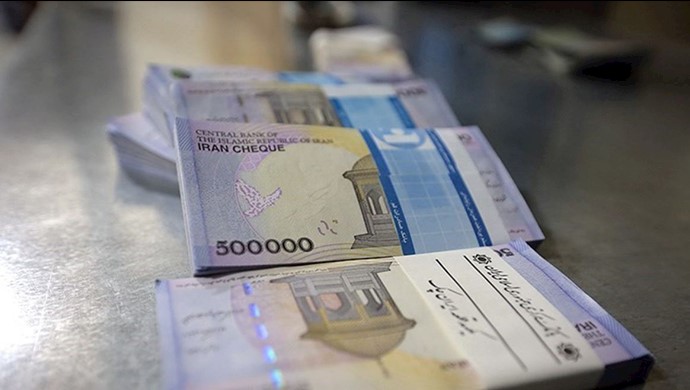Analysis by PMOI/MEK
Iran, March 10, 2020—The Iranian regime’s parliament rejected on February 5, 2020 the 2020 budget bill with 67 votes in favor and 114 votes against and 3 abstentions, while about hundred MP’s were also absent. There are many uncertainties about the future of the budget because the government adopted it at a time that the regime was not put back on the FATF blacklist and the coronavirus outbreak was still in the making.
For this reason, the budget was fundamentally questionable, and its figures did not reflect the reality of the micro and macro economy of Iran. So, it was speculated that the budget bill would be suspended until the new parliament begins its work. But in a sudden move on March 3, 2020, regime supreme leader Ali Khamenei ordered the budget bill to be sent to the Guardian Council for final approval.
For the first time, based on article 85 of the constitution of the regime, the budget bill was sent to the Guardian Council after being reviewed in the Parliament Integration Commission and without being put to vote in the entire Majlis. This is an unconventional act to solve one of the many political, social and economical problems Khamenei has been facing in the past months. Above that, it was the first time Khamenei directly interfered in this subject and ordered the parliament to pass the budget bill, a bill that is only on paper.
Why the parliament opposes the 2020 budget bill
On February 24, after the budget was discussed in the Integration Commission, it was put to vote at the parliament assembly. Although the majority of MPs were from the so-called reformist faction, allies of regime president Hassan Rouhani, the bill was rejected.
The budget was so unrealistic that members of both regime currents argued its rejection. “In fact, [the bill] imposes hidden expenses to people. Fixed and living subsidy are merged. It is all pressures on people,” MP Heshmatollah Falahtpisheh was quoted as saying by state-run Aftab Yazd Daily on February 25, 2020).
Abolfazl Aboutorab, another MP, said: “We have several times said that guaranteed buying of wheat should be reasonable but last year it wasn’t, and we were forced to buy wheat from different places at higher prices. It will definitely happen again in next year’s budget.”
“The 2020 budget is increasing. Increasing the issuance of bonds and treasury bonds means creating money and increasing inflation, and we should not overburden the country by issuing bonds,” MP Nader Pourghazi said.
Mostafa Kavakebian, MP from Rouhani’s faction, said, “If the parliament rejects the 2020 budget, nothing will happen. With this budget, we can only run one twelfth of the country.”
Also, state economic experts have acknowledged the decline in business income no longer allows for heavy taxes. The reason is clear: A disrupted economic cycle due to the coronavirus outbreak and regime’s inefficiency in controlling the situation. Production in major sectors, such as the automobile industry, which was already suffering from various problems, has stagnated and the housing sector has also fallen into recession with new conditions. On the other hand, small sector product and service providers are faced with a decline in demands and have no hope of relative prosperity as the Nowruz (Persian New Year) draws near.
Moreover, the government must pay heavy price to incur high costs to offset the losses on different economic sectors. Therefore, it can no longer count on cost savings. In addition, more important issue is the halt of non-oil exports to neighboring countries due to the spread of the coronavirus, which has disrupted whatever truth was left in the budget. The fixed costs remain, and additional costs have been added. In contrast, the expected earnings have not only diminished, but there is also no hope of earning even a part of it.
Khamenei’s order to circumvent the Parliament
After the approval of budget bill by the Integration Commission and its subsequent rejection by the Parliament, it was expected to be sent back for the government for review. But due to the current state of the society, Parliament Speaker Ali Larijani requested Khamenei to order the budget bill to be sent to the Guardian Council. State-run Jahan-e Sanat wrote: “It seems that coronavirus has also affected the budget bill. Some MPs say there are fears of holding two sessions of parliament and this can result in the rejection of the budget bill.”
Also, Khamenei did not want the budget bill to be suspended because of the absence of MPs and postpone this crisis until next year and next parliament. That’s why he used his limitless authority and circumvented the parliament.
In this regard, a politician from the Reformists Coordination Council said: “A very important issue is the parliament’s shutdown. During the budget review period, the parliament showed that it has no place in power pyramid and this was the same thing that happened during gasoline price hike.”
Khamenei’s order showed the parliament and the MPs how useless they are. Some regime’s officials and MPs said Larijani’s request from Khamenei to send the budget bill to the Guardian Council was the last nail to the coffin of the tenth parliament.
Parliament has no meaning in the Iranian regime
Adopting an unrealistic budget bill merely based on Khamenei’s order shows the crises plaguing at the top of the regime.
Khamenei’s order showed that the parliament, budget and law enforcement under the mullahs’ regime is nothing but a joke, and it is Khamenei who has the last word.
This does not show the supreme leader’s power but his weakness. He is forced to directly become engaged to solve the various crises. Khamenei tries to control the situation, but it is no secret that he is fast losing his grip.





